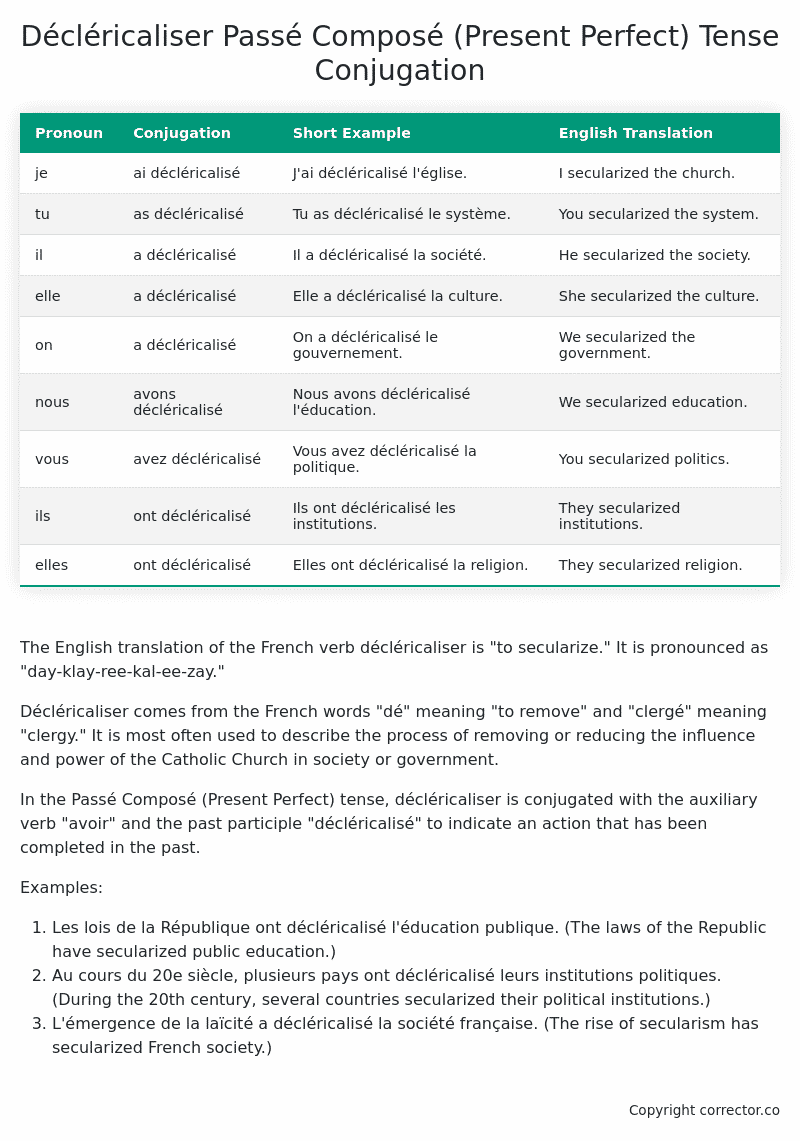Passé Composé (Present Perfect) Tense Conjugation of the French Verb décléricaliser
Introduction to the verb décléricaliser
The English translation of the French verb décléricaliser is “to secularize.” It is pronounced as “day-klay-ree-kal-ee-zay.”
Décléricaliser comes from the French words “dé” meaning “to remove” and “clergé” meaning “clergy.” It is most often used to describe the process of removing or reducing the influence and power of the Catholic Church in society or government.
In the Passé Composé (Present Perfect) tense, décléricaliser is conjugated with the auxiliary verb “avoir” and the past participle “décléricalisé” to indicate an action that has been completed in the past.
Examples:
- Les lois de la République ont décléricalisé l’éducation publique. (The laws of the Republic have secularized public education.)
- Au cours du 20e siècle, plusieurs pays ont décléricalisé leurs institutions politiques. (During the 20th century, several countries secularized their political institutions.)
- L’émergence de la laïcité a décléricalisé la société française. (The rise of secularism has secularized French society.)
Table of the Passé Composé (Present Perfect) Tense Conjugation of décléricaliser
| Pronoun | Conjugation | Short Example | English Translation |
|---|---|---|---|
| je | ai décléricalisé | J’ai décléricalisé l’église. | I secularized the church. |
| tu | as décléricalisé | Tu as décléricalisé le système. | You secularized the system. |
| il | a décléricalisé | Il a décléricalisé la société. | He secularized the society. |
| elle | a décléricalisé | Elle a décléricalisé la culture. | She secularized the culture. |
| on | a décléricalisé | On a décléricalisé le gouvernement. | We secularized the government. |
| nous | avons décléricalisé | Nous avons décléricalisé l’éducation. | We secularized education. |
| vous | avez décléricalisé | Vous avez décléricalisé la politique. | You secularized politics. |
| ils | ont décléricalisé | Ils ont décléricalisé les institutions. | They secularized institutions. |
| elles | ont décléricalisé | Elles ont décléricalisé la religion. | They secularized religion. |
Other Conjugations for Décléricaliser.
Le Present (Present Tense) Conjugation of the French Verb décléricaliser
Imparfait (Imperfect) Tense Conjugation of the French Verb décléricaliser
Passé Simple (Simple Past) Tense Conjugation of the French Verb décléricaliser
Passé Composé (Present Perfect) Tense Conjugation of the French Verb décléricaliser (this article)
Futur Simple (Simple Future) Tense Conjugation of the French Verb décléricaliser
Futur Proche (Near Future) Tense Conjugation of the French Verb décléricaliser
Plus-que-parfait (Pluperfect) Tense Conjugation of the French Verb décléricaliser
Passé Antérieur (Past Anterior) Tense Conjugation of the French Verb décléricaliser
Futur Antérieur (Future Anterior) Tense Conjugation of the French Verb décléricaliser
Subjonctif Présent (Subjunctive Present) Tense Conjugation of the French Verb décléricaliser
Subjonctif Passé (Subjunctive Past) Tense Conjugation of the French Verb décléricaliser
Subjonctif Imparfait (Subjunctive Imperfect) Tense Conjugation of the French Verb décléricaliser
Conditionnel Présent (Conditional Present) Tense Conjugation of the French Verb décléricaliser
Conditionnel Passé (Conditional Past) Tense Conjugation of the French Verb décléricaliser
L’impératif Présent (Imperative Present) Tense Conjugation of the French Verb décléricaliser
L’infinitif Présent (Infinitive Present) Tense Conjugation of the French Verb décléricaliser
Struggling with French verbs or the language in general? Why not use our free French Grammar Checker – no registration required!
Get a FREE Download Study Sheet of this Conjugation 🔥
Simply right click the image below, click “save image” and get your free reference for the décléricaliser present perfect tense conjugation!

Décléricaliser – About the French Passé Composé (Present Perfect) Tense
Formation of the Passé Composé
Set the auxiliary verb with either
Conjugate the auxiliary verb
Add the past participle
Common everyday usage patterns
Narrating Past Events
Sequential Actions
Describing Completed Actions
Interactions with other tenses
Imperfect Tense
Conditional and Future Tenses
Summary
I hope you enjoyed this article on the verb décléricaliser. Still in a learning mood? Check out another TOTALLY random French verb conjugation!


